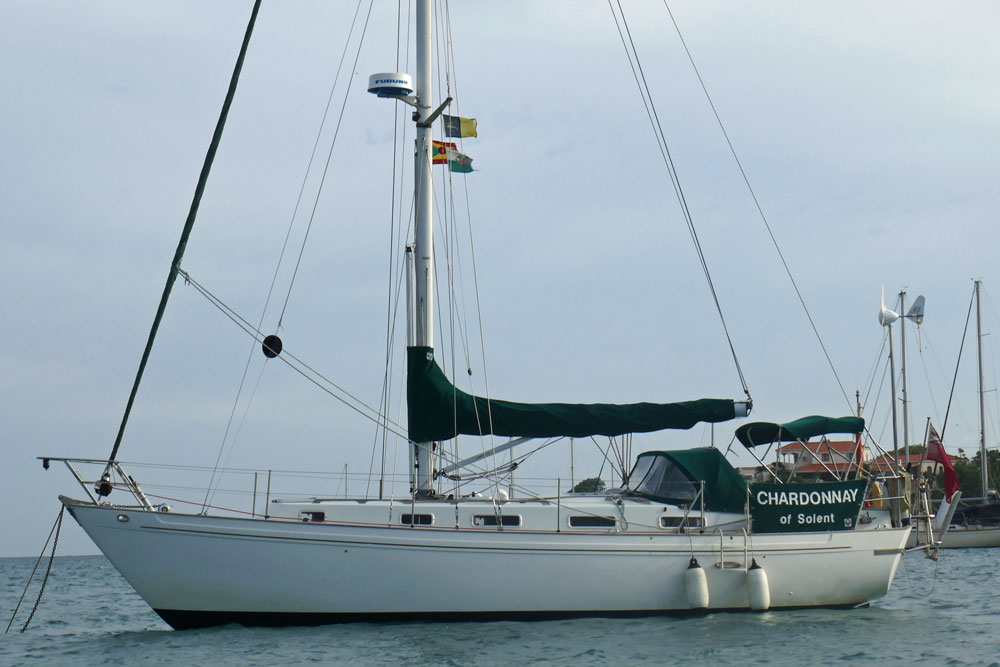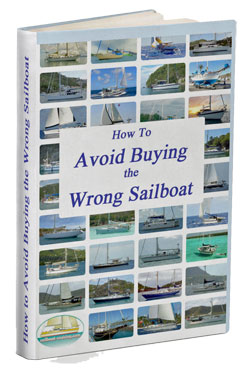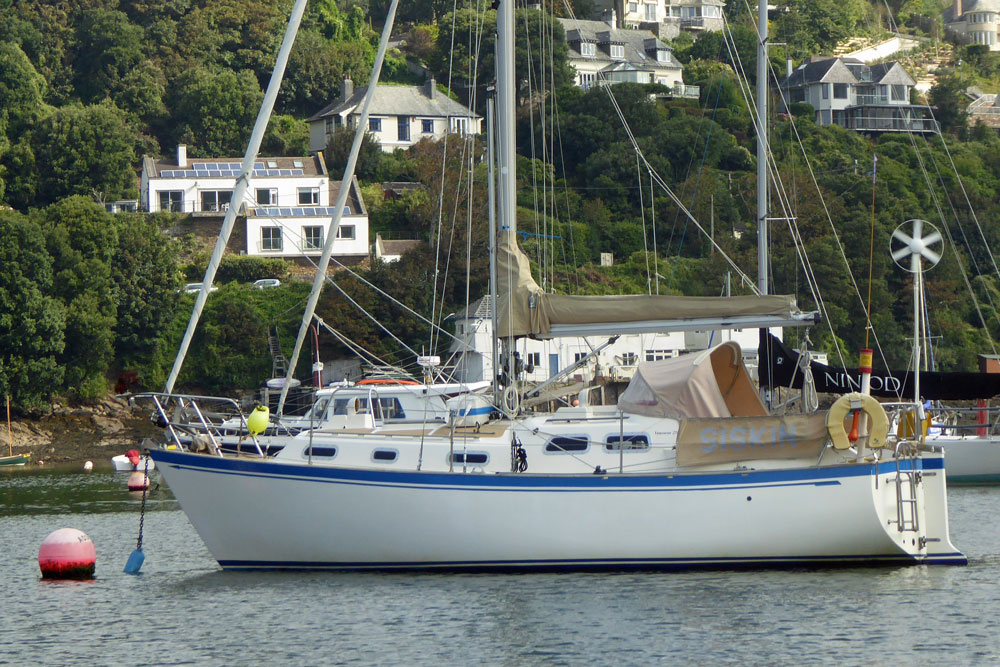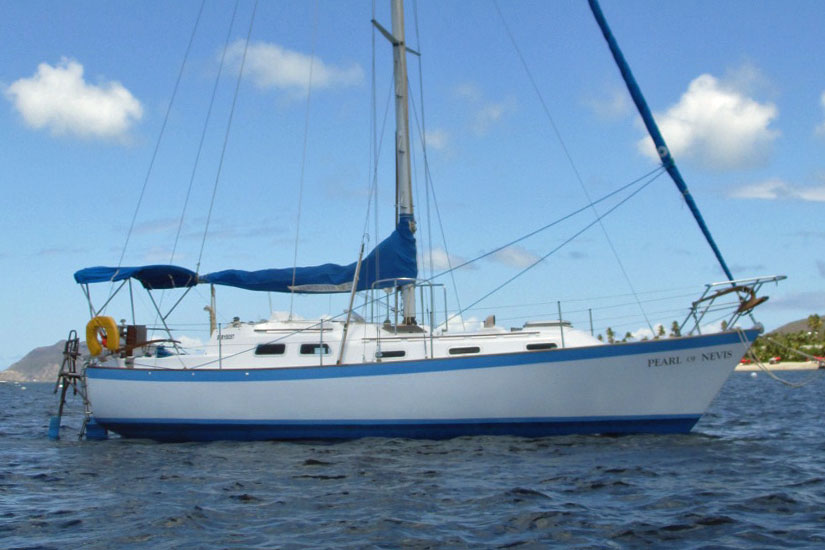- Home
- Cruising Yachts 35' to 40'
- Vancouver 36
The Vancouver 36 Sailboat
Specs & Key Performance Indicators
The Vancouver 36 sailboat is a design that has two distinct versions, both intended for bluewater cruising.
- The first version was designed by Robert B. Harris in 1977 and built in the United States by Durbeck's Inc and Hidden Harbor Boatworks until the late 1980s. Only 13 boats of this version were produced, with a heavy and strong construction, a cutter rig, a modified long keel and a canoe stern;
- The second version was designed by Tony Taylor in 1989 and built in the United Kingdom by Northshore Yachts. This version has a different hull shape, a fin keel, a skeg-hung rudder and a transom stern.
Both versions share the same name and length, but have different characteristics and performance.
It is the Tony Taylor version that is described here...
Published Specification for the Vancouver 36
Underwater Profile: Long keel
Hull Material: GRP (Fiberglass)
Length Overall: 36'0" (11.0m)
Waterline Length: 27'11" (8.5m)
Beam: 11'0" (3.4m)
Draft: 5'0" (1.5m)
Rig Type: Cutter
Displacement: 20,494lb (9,296kg)
Designer: Tony Taylor
Builder: Northshore Yachts Ltd (UK)
Year First Built: 1989
Published Design Ratios for the Vancouver 36
1. Sail Area/Displacement Ratio: 14.8
2. Ballast/Displacement Ratio: 37.1
3. Displacement/Length Ratio: 420
4. Comfort Ratio: 42.8
5. Capsize Screening Formula: 1.6
Summary Analysis of the Design Ratios for the Vancouver 36
1. A Sail Area/Displacement Ratio of 14.8 suggests that the Vancouver 36 will need a stiff breeze to get her going. In light conditions, unless you've got plenty of time on your hands, motor-sailing may be the way to go.
2. A Ballast/Displacement Ratio of 37.1 means that the Vancouver 36 will have a tendency to heel excessively in a gust, and she'll need to be reefed early to keep her sailing upright in a moderate breeze.
3. A Displacement/Length Ratio of 420, tells us the Vancouver 36 is firmly in the ultra-heavy displacement category. Load her up as much as you like and her performance will be hardly affected, not that it was ever startling. Few if any sailboats are built to this displacement category these days - but they remain popular with some long-distance sailors.
4. Ted Brewer's Comfort Ratio of 42.8 suggests that crew comfort of a Vancouver 36 in a seaway is similar to what you would associate with the motion of a heavy bluewater cruising boat. Pitching and rolling will be well damped - your cup of coffee on the salon table stands a reasonable chance of staying there in most conditions.
5. The Capsize Screening Formula (CSF) of 1.6 tells us that a Vancouver 36 would be a safer choice of sailboat for an ocean passage than one with a CSF of more than 2.0.
Any Questions?
Is the Vancouver 36 still in production and, if not, when did production end and how many of these sailboats were built?
Is the Vancouver 36 still in production and, if not, when did production end and how many of these sailboats were built?
The Vancouver 36 is not in production anymore. The Harris version was built from 1977 to the late 1980s, with a total of 13 boats. The Taylor version was built from 1989 to 2006, with a total of 66 boats.
What is the history of the builders of the Vancouver 36 and is either company still in business?
What is the history of the builders of the Vancouver 36 and is either company still in business?
The Harris version was built by Durbeck's Inc and Hidden Harbor Boatworks, both located in Sarasota, Florida. Durbeck's Inc was founded in 1968 by Richard Durbeck and specialized in heavy-duty cruising yachts. It went out of business in 1983. Hidden Harbor Boatworks was founded by John Kretschmer and continued to produce the Vancouver 36 until it also closed down in the late 1980s.
The Taylor version was built by Northshore Yachts, located in Itchenor, West Sussex. Northshore Yachts was founded in 1971 by John Baker and Peter Dyer and specialized in high-quality cruising yachts. It also produced other models under the Vancouver name, such as the Vancouver 27, 28, 32 and 34. It went into administration in 2013 and was acquired by Discovery Yachts Group.
What is the average cost of a secondhand Vancouver 36?
What is the average cost of a secondhand Vancouver 36?
The average cost of a secondhand Vancouver 36 depends on the condition, age, equipment and location of the boat. According to some online listings, the Harris version can range from $50,000 to $80,000 USD, while the Taylor version can range from $80,000 to $120,000 USD.
What other sailboats have been created by the designers of the Vancouver 36?
What other sailboats have been created by the designers of the Vancouver 36?
Robert B. Harris designed other sailboats under the Vancouver name, such as the Vancouver 25, 27, 32 and 42. He also designed other models for different builders, such as the Baba/Panda/Tashiba series for Ta Shing Yacht Building Co., the Passport series for Passport Yachts Inc., the Mason series for Pacific Asian Enterprises Inc., and the Norseman series for Ta Yang Yacht Building Co.
Tony Taylor designed other sailboats under the Vancouver name, such as the Vancouver Pilot (a pilothouse version of the Vancouver 36), as well as other models for Northshore Yachts, such as the Fisher series (a range of motorsailers), the Southerly series (a range of swing-keel yachts) and the Discovery series (a range of luxury cruising yachts).
The above answers were drafted by sailboat-cruising.com using GPT-4 (OpenAI’s large-scale language-generation model) as a research assistant to develop source material; to the best of our knowledge, we believe them to be accurate.
Other sailboats in the Vancouver range include:
Recent Articles
-
Luders 36 Review: Specs, Performance Ratios & Cruising Guide
Feb 17, 26 06:20 PM
An in-depth expert review of the Luders 36 sailboat. Explore technical specifications, design ratios, and the offshore cruising capabilities of this classic Bill Luders design. -
Deck-stepped vs. Keel-stepped mast: An Offshore Engineering Guide
Feb 16, 26 07:59 AM
Comparing deck-stepped vs. keel-stepped mast systems. We analyze the propped cantilever effect, structural loads, and maintenance for offshore sailors. -
Bowman 40 Sailboat Review: Specs, Performance & Cruising Analysis
Feb 16, 26 04:39 AM
An expert review of the Bowman 40 sailboat. We analyze its Chuck Paine design, build quality, performance ratios, and why it remains a top choice for blue-water cruising.



